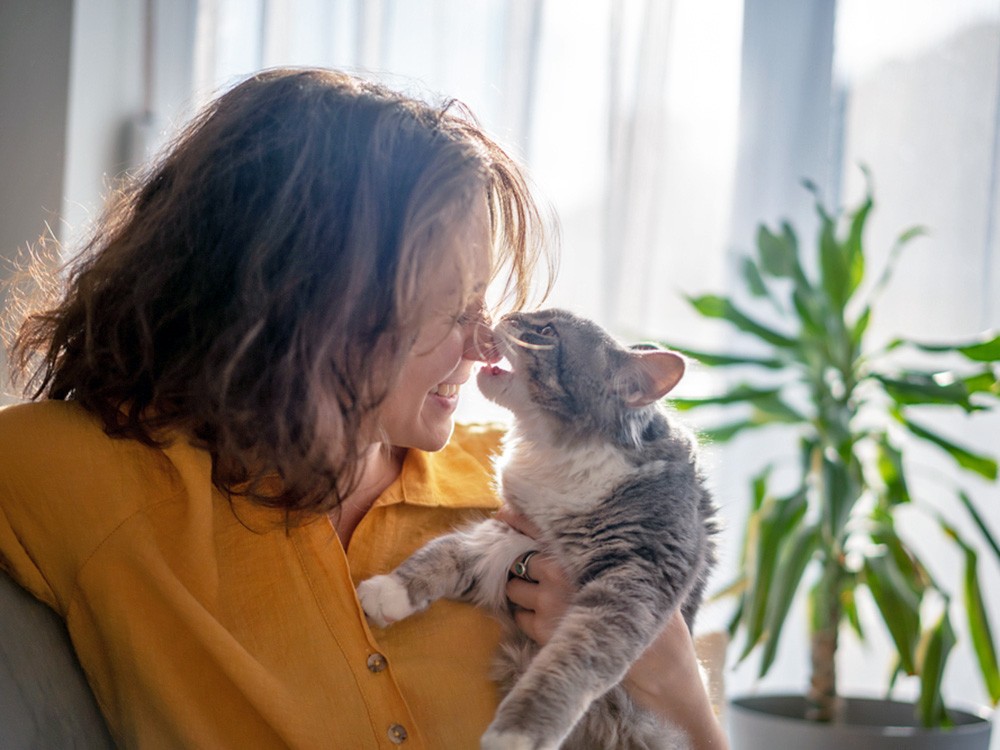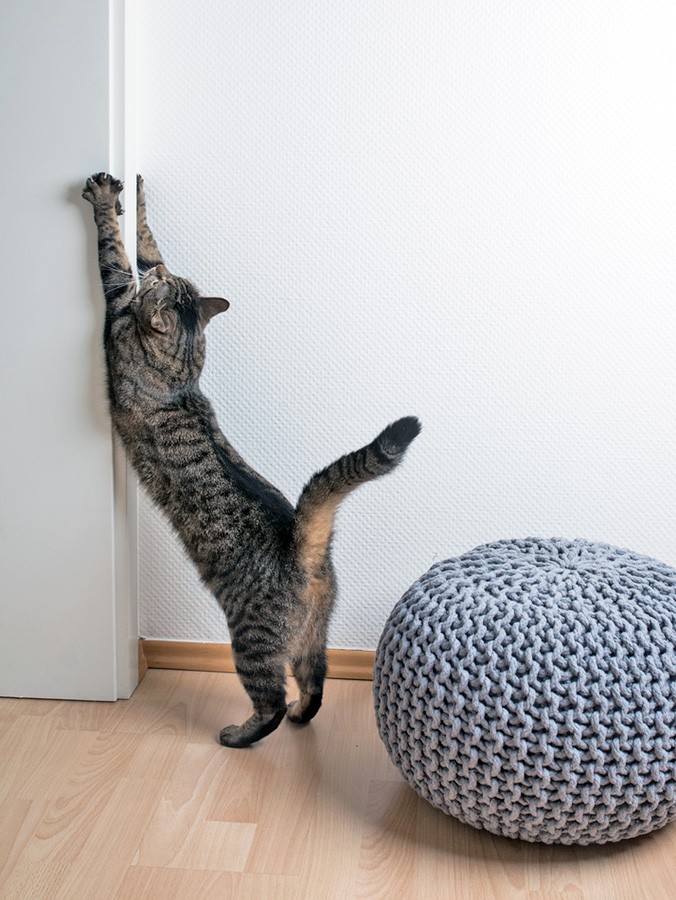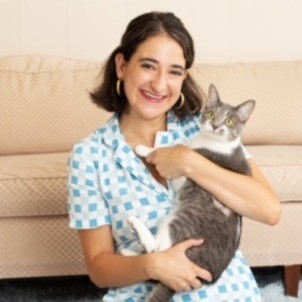Why Does My Cat Bite My Nose? At WHY.EDU.VN, we understand your curiosity about this peculiar feline behavior and offer insightful explanations. Discover the various reasons behind this action and how to address it, plus learn more about feline communication and cat behavior.
1. Decoding the Feline Enigma: Why the Nose Biting?
Cats, with their mysterious charm, often leave us pondering their actions. One such puzzling behavior is nose biting. It might seem odd, but there are several reasons behind it. Feline behavior is complex, and understanding these motivations can improve your relationship with your furry friend. A cat biting your nose isn’t always aggression, but sometimes a sign of affection, a call for attention, or even a signal of overstimulation. Let’s unravel the enigma behind this behavior.
2. Affectionate Nibbles: Is it a Sign of Love?
One of the most common reasons for a cat to bite your nose is affection. Cats often groom each other, and a gentle nibble can be their way of showing love.
2.1. Understanding “Love Bites”
“Love bites” are gentle, non-aggressive nibbles that cats give to their favorite people. This behavior often mimics the way cats interact with their kittens or fellow cats in their social group.
- Mimicking Grooming: Cats groom each other as a sign of bonding and affection. A gentle bite is part of this behavior.
- Social Bonding: Cats that are close to each other often engage in mutual grooming, which includes gentle biting.
- Expressing Comfort: Just as a human might hug someone they care about, a cat might give a love bite to show they feel comfortable and secure around you.
2.2. How to Recognize an Affectionate Bite
Distinguishing a love bite from an aggressive bite is crucial. Affectionate bites are usually gentle and accompanied by other signs of comfort and happiness, such as purring, kneading, and rubbing.
| Feature | Affectionate Bite (Love Bite) | Aggressive Bite |
|---|---|---|
| Intensity | Gentle nibble | Hard, painful bite |
| Body Language | Purring, kneading, rubbing, relaxed posture | Hissing, growling, flattened ears, tense body |
| Context | Occurs during petting or close interaction | Occurs when feeling threatened or cornered |
| Vocalizations | Soft purrs or meows | Hisses or growls |
| Other Behaviors | Licking, bunting (rubbing head against you) | Swatting, scratching |
| Intention | To show affection and bond | To defend or escape |




If your cat is relaxed, purring, and gently nibbling, it’s likely a sign of affection. However, if the bite is hard, painful, and accompanied by signs of aggression, it’s important to address the behavior differently.
3. Seeking Attention: Is Your Cat Trying to Tell You Something?
Cats are masters of communication, and sometimes a nose bite is simply a way of getting your attention. If your cat feels neglected or wants to play, they might resort to this behavior to elicit a response.
3.1. Understanding Attention-Seeking Behavior
Cats often develop unique ways to get their owners’ attention, and nose biting can be one of them. They quickly learn that this action elicits a reaction, whether positive or negative.
- Learned Behavior: If your cat has learned that biting your nose results in attention (even negative attention), they are likely to repeat the behavior.
- Boredom: Cats who are bored or lack stimulation may bite to initiate interaction.
- Need for Interaction: Sometimes, cats simply want to play, be petted, or receive affection and will use biting as a way to signal this need.
3.2. Signs Your Cat Wants Attention
Recognizing the signs that your cat wants attention can help you address their needs before they resort to biting.
| Sign | Explanation |
|---|---|
| Persistent Meowing | Cats may meow excessively to get your attention, especially if they feel ignored. |
| Following You Around | If your cat constantly follows you from room to room, they may be seeking your attention and interaction. |
| Rubbing Against Your Legs | Cats often rub against your legs as a way to mark you with their scent and seek affection. |
| Bringing You Toys | Some cats will bring you their toys to indicate that they want to play. |
| Staring at You | A cat staring intently at you may be trying to communicate that they want something, such as food, water, or attention. |
| Nudging or Pawing at You | Cats may nudge or gently paw at you to get your attention, especially when they want to be petted or played with. |
3.3. Providing Adequate Attention
To reduce attention-seeking nose biting, ensure your cat receives enough playtime, affection, and mental stimulation.
- Regular Playtime: Schedule daily playtime sessions with your cat to provide physical exercise and mental stimulation.
- Interactive Toys: Use interactive toys like wands, laser pointers, and puzzle feeders to keep your cat engaged and entertained.
- Affectionate Interactions: Spend time petting, grooming, and talking to your cat to strengthen your bond and provide them with the attention they crave.
4. Playful Nips: Is Your Cat in a Playful Mood?
Kittens often bite as part of their play, and adult cats may retain this behavior. If your cat is in a playful mood, they might bite your nose as an invitation to play.
4.1. Recognizing Playful Behavior
Playful bites are usually gentle and accompanied by other playful behaviors, such as pouncing, chasing, and batting.
| Behavior | Description |
|---|---|
| Pouncing | Cats may pounce on toys, objects, or even your feet as part of their hunting instincts. |
| Chasing | Cats love to chase moving objects, such as laser pointers, toy mice, or even their own tails. |
| Batting | Cats often bat at objects with their paws, especially small, enticing items that move or make noise. |
| Wrestling | Cats may engage in playful wrestling with other cats or even with you, using their paws and teeth in a gentle, non-aggressive manner. |
| Zoomies | Sudden bursts of energy where cats run around the house at high speed, often accompanied by playful meows or chirps. |
| Hunting Games | Simulating hunting scenarios with toys to engage their predatory instincts. |
4.2. Redirecting Playful Bites
If your cat bites your nose during playtime, redirect their attention to an appropriate toy. Keep a variety of toys on hand to offer them alternatives.
- Interactive Toys: Wands, feather toys, and laser pointers are great for engaging your cat’s hunting instincts.
- Kicker Toys: These toys are designed for cats to grab and kick with their hind legs, providing a safe outlet for their energy.
- Puzzle Toys: Puzzle toys dispense treats when your cat solves a puzzle, providing mental stimulation and rewarding play.
4.3. Establishing Boundaries
It’s important to establish boundaries during playtime to prevent your cat from biting too hard. If they bite too hard, stop the play session immediately and ignore them for a few minutes. This teaches them that biting results in the end of playtime.
5. Overstimulation: Is Your Cat Reaching Their Limit?
Sometimes, a cat bites your nose because they’re overstimulated. This can happen during petting or playtime when they reach their limit and need a break.
5.1. Recognizing Signs of Overstimulation
Cats have a threshold for how much stimulation they can handle. When they reach this limit, they may become agitated and bite.
| Sign | Explanation |
|---|---|
| Twitching Tail | A twitching or thumping tail is a common sign of overstimulation. It indicates that your cat is becoming agitated and uncomfortable. |
| Flattened Ears | When a cat’s ears are flattened against their head, it’s a clear sign that they are feeling overwhelmed or threatened. This is often accompanied by other signs of stress. |
| Dilated Pupils | Dilated pupils can indicate arousal, fear, or overstimulation. If your cat’s pupils suddenly become very large during petting or playtime, it may be a sign that they are becoming overstimulated. |
| Increased Vocalization | Some cats may become more vocal when they are overstimulated, meowing, hissing, or growling to communicate their discomfort. |
| Tense Body Language | A tense body, with muscles tightened and fur standing on end, indicates that your cat is feeling anxious or stressed. This is a clear sign that they need to be given space. |
| Sudden Biting or Scratching | If your cat suddenly bites or scratches you during petting or playtime, it’s a strong indication that they have reached their limit and need to be left alone. This is often preceded by other subtle signs of overstimulation, such as tail twitching or flattened ears. |
5.2. Avoiding Overstimulation
To prevent overstimulation, pay attention to your cat’s body language and stop petting or playing when they show signs of agitation.
- Short Petting Sessions: Keep petting sessions short and sweet, especially with cats who are prone to overstimulation.
- Gentle Touch: Use a gentle touch and avoid areas that your cat finds sensitive, such as their belly or tail.
- Observe Body Language: Pay close attention to your cat’s body language and stop petting if they show signs of discomfort.
5.3. Providing a Safe Retreat
Ensure your cat has a safe place to retreat to when they feel overwhelmed. This could be a quiet room, a cat tree, or a cozy bed.
6. Stress and Anxiety: Is Your Cat Trying to Tell You They’re Unhappy?
In some cases, nose biting can be a sign of stress or anxiety. If your cat is feeling threatened or uncomfortable, they might bite as a defensive mechanism.
6.1. Identifying Stress and Anxiety in Cats
Cats can experience stress and anxiety for various reasons, such as changes in their environment, loud noises, or conflicts with other pets.
| Sign | Explanation |
|---|---|
| Hiding | Cats may hide when they feel stressed or anxious, seeking refuge in a quiet, safe place where they feel protected from perceived threats. |
| Changes in Appetite | Stress and anxiety can lead to changes in appetite, with some cats eating less or refusing food altogether, while others may overeat as a coping mechanism. |
| Excessive Grooming | Cats may engage in excessive grooming as a way to soothe themselves when they are feeling stressed or anxious, sometimes leading to bald spots or skin irritation. |
| Destructive Behavior | Anxious cats may exhibit destructive behaviors such as scratching furniture, chewing on objects, or spraying urine outside the litter box as a way to release pent-up energy and frustration. |
| Increased Vocalization | Some cats may become more vocal when they are feeling stressed or anxious, meowing, hissing, or growling more frequently than usual to communicate their discomfort or fear. |
| Aggression | Stressed or anxious cats may become more aggressive towards people or other animals in the household, biting, scratching, or hissing as a way to defend themselves from perceived threats. |
6.2. Addressing Stress and Anxiety
If you suspect your cat is biting your nose due to stress or anxiety, identify the source of their stress and take steps to alleviate it.
- Create a Calm Environment: Provide a quiet, safe environment for your cat, away from loud noises and other stressors.
- Provide Vertical Space: Cats feel more secure when they have access to vertical space, such as cat trees or shelves.
- Use Calming Products: Pheromone diffusers and sprays can help reduce anxiety in cats.
- Consult a Veterinarian: If your cat’s stress and anxiety are severe, consult a veterinarian.
6.3. Gradual Changes
If you need to introduce changes into your cat’s environment, do so gradually. Sudden changes can be very stressful for cats.
7. How to React to Nose Biting
Your reaction to your cat’s nose biting should depend on the reason behind it. If it’s a love bite or a playful nip, you can usually ignore it. However, if it’s unwanted or painful, you need to take action.
7.1. Gentle Discouragement
If your cat bites your nose and you don’t like it, gently push them away and say “no” in a firm voice. Consistency is key.
- Avoid Yelling: Yelling can scare your cat and make them more anxious.
- Avoid Physical Punishment: Never hit or punish your cat physically. This can damage your relationship and lead to more behavioral problems.
- Be Consistent: Always react the same way when your cat bites your nose so they understand that the behavior is not acceptable.
7.2. Positive Reinforcement
When your cat exhibits good behavior, reward them with treats, praise, or petting. This reinforces the behaviors you want to see.
- Treats: Use small, healthy treats to reward your cat for good behavior.
- Praise: Use a calm, soothing voice to praise your cat when they do something you like.
- Petting: Pet your cat gently and lovingly when they are behaving well.
7.3. Consulting a Professional
If your cat’s nose biting is persistent or accompanied by other behavioral problems, consult a veterinarian or a certified cat behaviorist.
8. When to Worry
Most nose biting is harmless, but there are times when it can indicate a more serious problem.
8.1. Signs of Aggression
If your cat’s nose biting is accompanied by signs of aggression, such as hissing, growling, or flattened ears, it’s important to address the behavior immediately.
| Sign | Description |
|---|---|
| Hissing | A sharp, forceful expulsion of air from the mouth, indicating fear, defensiveness, or aggression. |
| Growling | A low, guttural sound emanating from the throat, signaling displeasure, warning, or imminent attack. |
| Flattened Ears | Ears pressed tightly against the head, signifying fear, anxiety, or readiness to defend oneself. |
| Dilated Pupils | Enlarged pupils indicating heightened arousal, fear, or aggression. |
| Tense Body | Muscles tightened and body posture rigid, conveying readiness to strike or defend. |
| Swatting | A quick, forceful strike with the paw, often with claws extended, intended to ward off a perceived threat. |
| Biting | A forceful clamping down with the teeth, inflicting pain or injury, employed as a means of defense or attack. |
| Scratching | Raking with the claws, causing injury or marking territory, often used in conjunction with other aggressive behaviors. |
8.2. Medical Issues
Sometimes, behavioral changes can be a sign of an underlying medical issue. If your cat suddenly starts biting your nose and they haven’t done it before, consult a veterinarian to rule out any medical problems.
| Symptom | Possible Cause |
|---|---|
| Sudden Aggression | Pain, neurological disorders, hyperthyroidism |
| Changes in Appetite | Dental problems, gastrointestinal issues, kidney disease |
| Excessive Vocalization | Cognitive dysfunction, hyperthyroidism, high blood pressure |
| Litter Box Problems | Urinary tract infection, kidney stones, arthritis |
| Changes in Activity Level | Arthritis, heart disease, respiratory problems |
| Increased Thirst and Urination | Kidney disease, diabetes, hyperthyroidism |
8.3. Professional Help
A vet or cat behaviorist can help you identify the cause of your cat’s nose biting and develop a plan to address it.
9. Addressing Nose-Biting Behavior
Addressing nose-biting behavior involves understanding the cause and implementing appropriate strategies.
9.1. Environmental Enrichment
Provide your cat with plenty of environmental enrichment to keep them stimulated and happy. This includes toys, scratching posts, cat trees, and puzzle feeders.
- Toys: Rotate toys regularly to keep your cat interested.
- Scratching Posts: Provide a variety of scratching posts to satisfy your cat’s natural scratching instincts.
- Cat Trees: Cat trees provide vertical space for your cat to climb and explore.
- Puzzle Feeders: Puzzle feeders challenge your cat mentally and physically while they eat.
9.2. Training and Consistency
Use consistent training methods to teach your cat that nose biting is not acceptable.
- Positive Reinforcement: Reward good behavior with treats, praise, or petting.
- Gentle Discouragement: Gently push your cat away and say “no” when they bite your nose.
- Avoid Punishment: Never hit or punish your cat physically.
9.3. Medical Evaluation
If behavioral changes occur suddenly, it is very important to schedule a vet visit to rule out any potential medical problems.
10. The Importance of Understanding Feline Behavior
Understanding why your cat bites your nose involves interpreting feline behavior, recognizing its underlying causes, and implementing effective and appropriate strategies.
10.1. Enhancing the Bond
Understanding and addressing your cat’s behavior enhances your bond and improves their quality of life.
10.2. Providing a Happy Environment
By understanding your cat’s needs and providing a stimulating and safe environment, you can ensure they lead a happy and fulfilling life.
11. FAQs About Cat Nose Biting
Here are some frequently asked questions about why cats bite noses:
11.1. Why does my cat lick me then bite me?
Licking followed by a gentle bite is often a sign of affection, mimicking grooming behavior among cats.
11.2. What does it mean when a cat licks your face?
Licking your face can mean affection, grooming, or a way of seeking your attention.
11.3. Why is my cat obsessed with my nose?
Your nose carries your scent, and your cat may bite, rub, or lick it to become familiar with you.
11.4. Why does my cat bite my face while being affectionate?
Gentle face biting is often a love bite, but if it bothers you, discourage the behavior.
11.5. Is nose biting always a sign of affection?
Not always; it can also indicate playfulness, overstimulation, or stress.
11.6. How can I stop my cat from biting my nose?
Gently discourage the behavior, provide appropriate toys, and ensure they have a calm environment.
11.7. When should I see a vet about my cat’s biting?
If the biting is aggressive or accompanied by other behavioral changes, consult a vet.
11.8. What if my cat’s nose biting is painful?
If the biting is painful, it could be due to overstimulation, stress, or aggression. Address the underlying cause.
11.9. Can a change in diet affect my cat’s behavior?
Yes, a change in diet can affect your cat’s behavior, particularly if they have allergies or sensitivities.
11.10. What are some calming products for anxious cats?
Pheromone diffusers, calming collars, and anxiety-reducing supplements can help.
12. Conclusion: Embracing the Quirks of Feline Behavior
Understanding why your cat bites your nose involves a blend of recognizing affection, interpreting behavior, and addressing needs. By observing their body language and adjusting their environment, you can enjoy a happy, loving relationship with your cat.
Remember, every cat is unique. Some may bite out of affection, while others do it for attention or play. The key is to understand your cat’s individual personality and respond accordingly.
If you’re still curious or have more questions about your cat’s behavior, don’t hesitate to reach out to the experts at WHY.EDU.VN. Our team is dedicated to providing accurate and reliable information to help you understand and care for your feline friend. You can find us at 101 Curiosity Lane, Answer Town, CA 90210, United States, or contact us via WhatsApp at +1 (213) 555-0101. Visit our website at WHY.EDU.VN to submit your questions and explore our extensive database of answers from leading experts. Let why.edu.vn be your trusted resource for all things feline.

